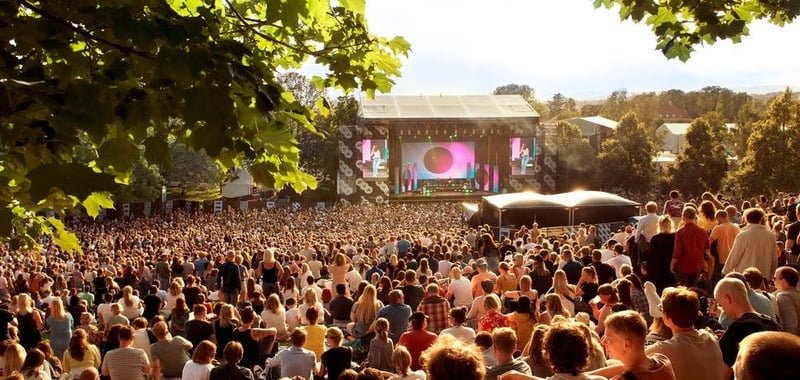As Norway becomes one of the first European countries to allow live music again, current capacity limits mean shows will not be financially viable in the near future
Original story By IQ on 12 May 2020

Norway's Øya Festival will not take place this year / image © Øya Festival/Facebook
Live music was allowed to return to Norway earlier this month, but event organisers in the country – as well as those in neighbouring Sweden, which has not seen a blanket ban on shows – say the return to business for the live industry is still some way off.
After almost two months of silence, concerts of up to 50 people were permitted to take place in Norway from 7 May, providing a one-metre space is kept between attendees, with capacity limits set to increase to 200 people by mid-June if all goes well and, possibly, to 500 by September
“It’s great to see that some concerts can take place again,” says Anders Tangen of Norwegian live music association Norske Konsertarrangører (NKA), “but to make it very clear – it’s not something that can keep our industry economically afloat.”
In a similar vein to responses from those in the Spanish music industry when reopening plans were unveiled, promoters in Norway suggest that initial restrictions are not viable for live events.
“A capacity of 50 works for private events like weddings and anniversaries, but I don’t see a concert boom returning with these restrictions,” Tonje Kaada, CEO of Norway’s Øya Festival tells IQ. “Maybe if the limit increases to 200 like they say it may from 15 June, but I think most promoters need a 500 limit before finding it financially healthy to restart their businesses.”
“IT’S GREAT TO SEE THAT SOME CONCERTS CAN TAKE PLACE AGAIN, BUT IT’S NOT SOMETHING THAT CAN KEEP OUR INDUSTRY ECONOMICALLY AFLOAT”
Øya was among major festivals in Norway to cancel its 2020 edition following the extension of the government’s large-scale event ban to 1 September. Although having to cancel is “every festival organiser’s nightmare”, Kaada states it was helpful to be able to do so “in such controlled circumstances”, with time to discuss with other organisers and the wider industry.
“It’s been an incredibly tough time for our whole eco system, but at least we’re in the same boat and I really feel that everyone is doing what they can to support each other.”
Mark Vaughan from All Things Live Norway agrees that there is “no financial reward for anyone” putting on an event under current restrictions. However, the reopening, albeit slight, does “give people a chance to work in many different sectors of the business”, says Vaughan, adding that putting on shows, even under the restrictions, is “a positive step for everyone”.
In addition to capacity limits, the need to maintain social distancing at events provides more problems for promoters. FKP Scorpio Norway head promoter Stian Pride says the one-metre distancing guideline means it is “very difficult to make [shows] work”.
“THE ECONOMIC MARGINS FOR VENUES AND FESTIVALS WERE TIGHT BEFORE THE CRISIS, AND THIS MAKES IT EVEN WORSE”
In order to facilitate easier and safer reopening, the NKA has developed guidelines for venues and organisers on how to meet regulations from the health authorities. “It’s a lot to consider and implement,” says Tangen, “but at the same time there is of course eagerness to open up and get back to come sort of normality.
“The economic margins for venues and festivals were tight before the crisis, and this makes it even worse.”
The situation in Norway is much the same as that in neighbouring Sweden which, unlike its western European counterparts, has yet to impose a full lockdown, keeping bars, restaurants and shops open and allowing events of up to 50 people.
However, the country’s live industry is facing the same issues as most others. “No concerts at all are taking place,” Edward Janson of Swedish promoter Triffid and Danger tells IQ. “We were supposed to promote 42 concerts from mid-March to late May and all of these have either been cancelled or postponed.” Janson adds that he is “more and more sceptical” as to whether shows rescheduled to autumn will be able to go ahead.
Indeed, unlike in many other countries, no end-date for restrictions or plan for resuming normal business has been given in Sweden, making it difficult for promoters to plan for the future, says Joppe Pihlgren of Swedish live music organisation Svensk Live.
“Our focus is to help our members to survive this spring and summer.”
